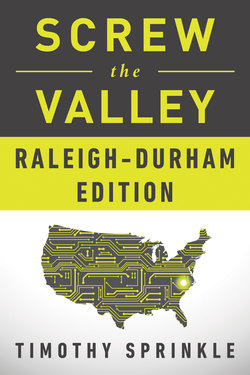Читать книгу Screw the Valley: Raleigh-Durham Edition - Timothy Sprinkle - Страница 5
На сайте Литреса книга снята с продажи.
ОглавлениеIntroduction
RALEIGH a lot of things. It’s the capital of North Carolina, for one thing. And the greater Raleigh-Durham-Chapel Hill metro area is also home to three major research universities—Duke, North Carolina State, and the University of North Carolina, which comprise an area called the Research Triangle—as well as more than two dozen towns spread out over some eight counties, accounting for a population of roughly two million people as of 2013.
It’s big. Really big.
But none of that had anything to do with why I first visited the Raleigh-Durham region for my book, Screw the Valley: A Coast-to-Coast Tour of America’s New Startup Culture. I was there because of the Research Triangle Park (RTP), the 7,000-acre science, biotechnology, and research office park situated roughly equidistant between Raleigh and Durham that has anchored the area’s economy since the early 1960s.
“The Park was designed in the 1950s to be the new suburban research park,” Bob Geolas, the current CEO of Research Triangle Park, told me during one of my trips to the area. “It was very dynamic thinking at the time. Mom and Dad would live in the suburbs. Dad would drive his car to the research park. And that worked great.”
It still does, to some extent. As of today, some 40,000 people come to work every day in the Park, more than 10,000 of them at what is the second-largest IBM facility in the world and 5,000 more at the pharmaceutical firm GlaxoSmithKline’s sprawling research center in the area. Cisco, SAS, Microsoft, Oracle, and many other tech giants also have operations within the Park’s boundaries.
I soon learned there was much more going on in the Triangle region than just the blue chip companies at work in the RTP. Raleigh-Durham is also home to an active and growing startup ecosystem, with incubators, networking groups, coworking spaces, and mentorship organizations spread out all over the area, specializing in everything from biotechnology to enterprise support, consumer apps, and more. A lot of it mirrors the economic foundations of the region as a whole—there is a little bit of everything in the Triangle, so you’ll find startups focused on just about every niche imaginable—but there’s also an unmistakable connection to established community in the area: large numbers of ambitious young people, drawn to the Raleigh-Durham area for school who end up sticking around to start their careers. More and more of them don’t want the big company experience, so they’re starting their own enterprises in an effort to do the work they want to do in the place they want to do it. And they’re finding that the Triangle has the resources they need for long-term growth and success.
“You know, I think one of the things that I find myself trying to encourage in the local startup community is there are things about North Carolina that you can do here that you can’t do elsewhere,” Luke Fishback, the founder of Durham-based energy analytics company PlotWatt, told me. “And I fear that too often startups that are kind of outside of the Valley or are outside of one or two other places are always trying to make their startup community, you know, ‘Silicon Valley East.’ When, in reality, there are so many things we can do here in North Carolina that you can’t do in Silicon Valley because of cost and because of what’s available in terms of space.”
“It’s about kind of, you know, embracing the ‘North Carolina’ of North Carolina. And I think that when startups do more of that they don’t tend to have regrets about being here or bypassing the Silicon Valley path”
He’s right. The Triangle is the Triangle, and, for startup founders, that comes with its own set of pros and cons.
